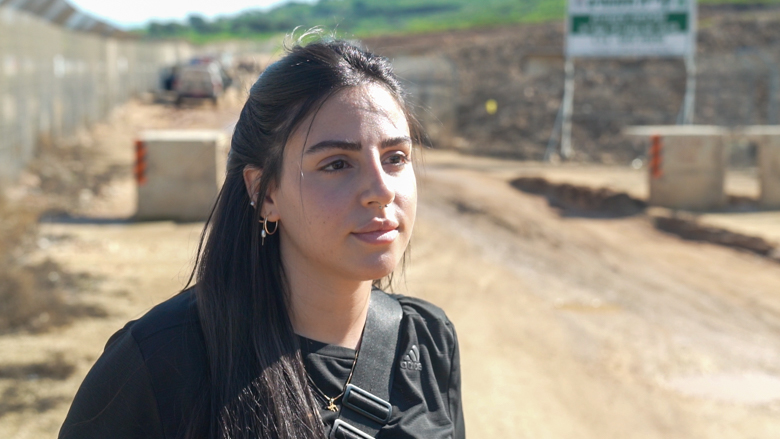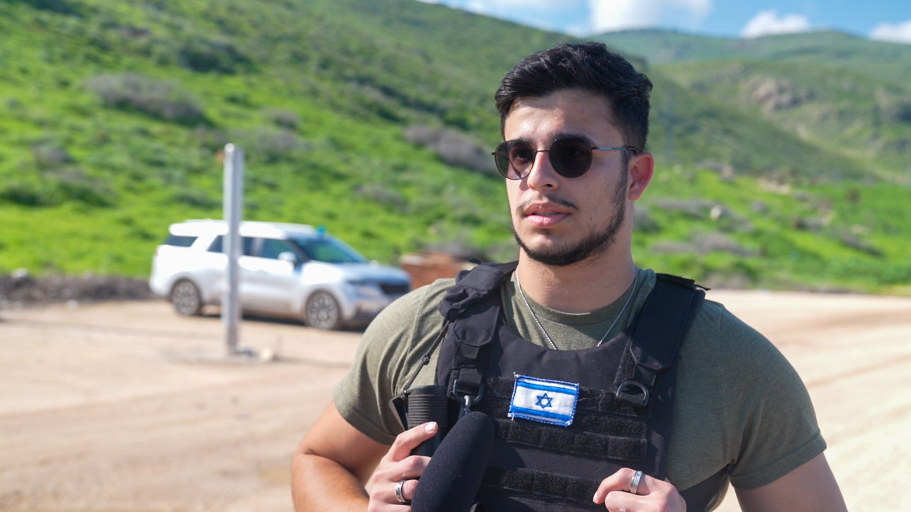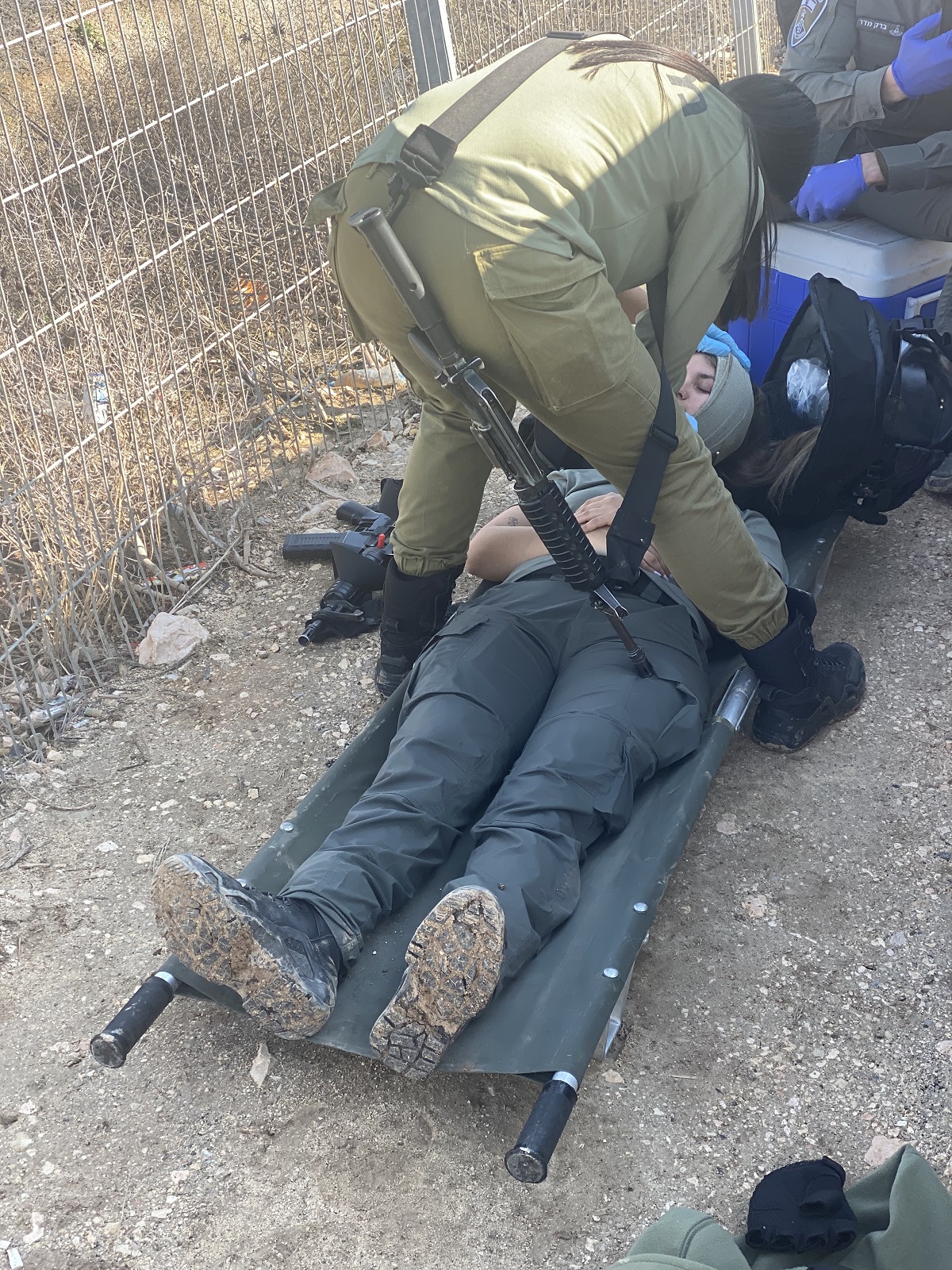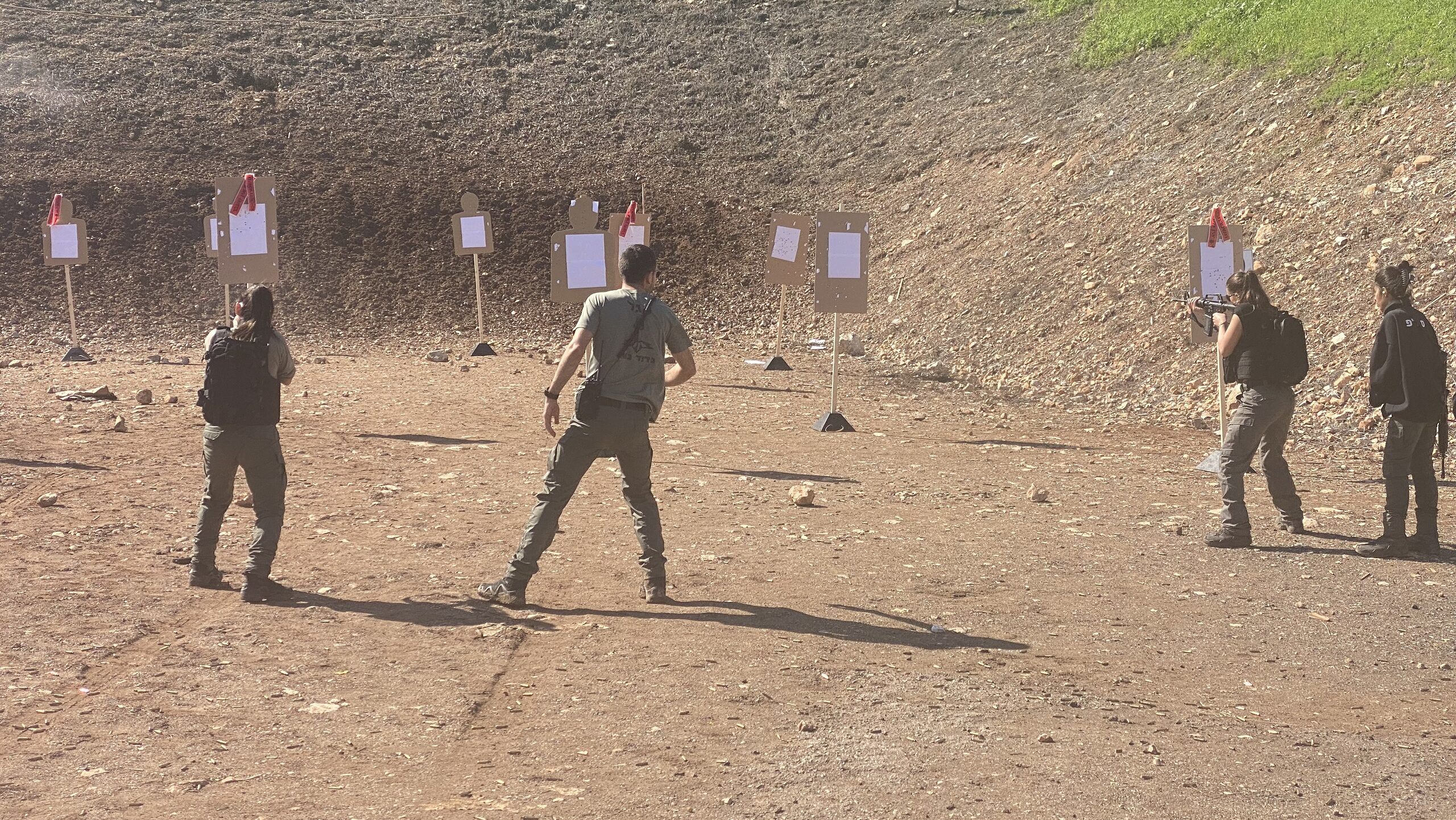Israel Border Police Reservists Leave Everything Behind To Prevent ‘the Next October 7’
Dozens of mass attacks have already been prevented, and every single day, border police officers respond to reports of credible threats
Arriving to the sound of rapid gunfire, the heavy smell of gunpowder, and a line of police vehicles parked deep in the hills of Israel’s Mount Gilboa nature reserve—nestled close between Jordan and the northernmost cities of the Palestinian Authority—officers of the Israel Border Police’s Tzur Battalion were running drills to hone their skills.
The Media Line had come to meet with just a fraction of the hundreds of reservist officers who were called up in the wake of the October 7 attacks.
Following the Hamas terror group’s Black Sabbath atrocities, Israelis worldwide knew exactly what was coming. And far from shying away from the call of duty, the draft for reservists was met with a response rate of 130%. Within 24 hours of Israel’s call to mobilize 300,000 reservist servicemen and women, over 330,000 volunteered.
Like most Israelis, the volunteer soldiers and police officers were personally affected—either directly or with one degree of separation—by the massive terrorist infiltration that day. As such, they were personally motivated to return to duty as soon as possible.
I wanted to have my gun and my uniform and to feel that I’m a part of something big. To help people.
Sgt. 1st Class Eliya Torjeman, a 24-year-old border police reservist in the Tzur Battalion, told The Media Line that she lost two of her best friends on October 7. “I don’t think I have the words to describe the feelings inside,” she said. “But I waited to come to reserve duty… I was sitting at home and going crazy. I wanted to have my gun and my uniform and to feel that I’m a part of something big. To help people.”

Border Police Sgt. 1st Class (res.) Eliya Torjeman, Feb. 7, 2024. (Tamir Hayun/The Media Line)
Torjeman, who today works in airport security, dropped everything in her personal life—like so many others—to return to service.
You just need to work day and night, around the clock, every day. Even if it’s hard, you can’t stop because somebody has to do it.
Another border police reservist in the Tzur Battalion, 25-year-old Sgt. Tal Yarden, likewise answered the call in early December, leaving behind a job in cybersecurity and his family. He, too, lost a close friend on October 7—a former commanding officer who was killed in the line of duty protecting the community of Sderot from Hamas’ assault.

Border Police Sgt. (res.) Tal Yarden. Feb. 7, 2024. (Tamir Hayun/The Media Line)
“I have a routine,” he told The Media Line. But October 7 “changed everything. … I don’t see my girlfriend, I don’t see my family. I don’t see my dog. You just need to work day and night, around the clock, every day. Even if it’s hard, you can’t stop because somebody has to do it,” he said.
This holiday season, give to:
Truth and understanding
The Media Line's intrepid correspondents are in Israel, Gaza, Lebanon, Syria and Pakistan providing first-person reporting.
They all said they cover it.
We see it.
We report with just one agenda: the truth.


We’re fighting for something we believe in, and we’ll handle everything afterward
The commander of the Tzur Battalion, Israel Border Police Chief Inspector (res.) Yoav Cohen, has been active for four months, putting his high-tech job, an independent photography business, and his family on hold. “My wife is the real hero,” said Cohen, speaking to The Media Line about how she cares for their three children in his absence.

Border Police Chief Inspector (res.) Yoav Cohen, Tzur Battalion commander, Feb. 7, 2024. (Tamir Hayun/The Media Line)
And this is the story for nearly everyone under his command, added Cohen. “We have business owners, students, independent freelancers … the toll this has taken on everyone is incredibly difficult. But at the same time, if you ask them, you’ll hear 100% across the board that we will pay the price to make sure that Israel stays a strong democracy. We’re fighting for something we believe in, and we’ll handle everything afterward.”
While the Israeli military shores up Israel’s northern border with Lebanon and Syria and its southern border with Gaza, the border police maintain Israel’s security along its longest border opposite the Palestinian Authority in the West Bank. They conduct hundreds of arrests, raids, weapons seizures, and other security operations.
In the months following October 7, the border police’s primary mission has been to prevent another infiltration inspired by Hamas’ brutal and heinous attack. And they’ve been busy. According to Cohen, dozens of mass attacks have already been prevented, and every single day, border police officers respond to reports of credible threats.
In fact, as The Media Line was conducting its interviews, the Tzur Battalion—which operates in the Gilboa region near Palestinian cities like Jenin—scrambled toward an area where sensors detected a possible infiltration.
“Without going into too much detail,” said Cohen, “we can say there have been threats that were stopped at the last minute. And there are those who, when they see the presence of our teams in the fields, they won’t try.”
“We’ve also been part of arrests, searches where we’ve taken illegal weapons out of the hands of people who should not have weapons, because they did plan [an attack]. And stopping them [alleged terrorists] at the planning stages along with our intelligence is the best time to make sure that nothing even comes remotely close to happening,” added Cohen.
Among the perpetrators, Cohen said they’ve arrested affiliates and members of Hamas, Palestinian Islamic Jihad, ISIS, and other smaller groups. But there are also many unaffiliated “lone wolves,” said Cohen, which are attacks that are hardest to detect.
“Unfortunately, we can’t get into the mindset and into the head of anyone who wants to take a knife or a gun that they may have at home and do something terrible with it. We can only stop the threat as quickly as possible,” he added.
Asked about the rules regarding the use of deadly force and accusations of summary executions, which critics often levy against Israeli forces, Cohen said that the laws are very clear. If there’s a direct threat to officers or anyone surrounding them, then they will open fire. “But with that,” Cohen continued, “there’s an entire gray area, and this goes back to who we’re fighting, which is Hamas, a terrorist organization that doesn’t differentiate themselves by using a uniform,” and that blends with the civilian population.
“Any civilian that is caught within the line of fire is a tragedy,” he continued. “We never want that to happen. We want our children and any child on the Palestinian side or anywhere else to sleep, secure and safe,” he said.

Israel Border Police officers practice administering first aid, Feb. 7, 2024. (Aaron Poris/The Media Line)
Pressed on how the border police can ensure its high standards, particularly as a reservist whose professional and personal feelings may be at odds with one another, Yarden said, “You have no choice. You have to do the job perfectly, and without thinking.” That said, he added that they “need to practice and do a bit of shooting at the range to get back in shape.”
As for those who accuse Israeli forces of desiring more conflict, Torjeman smiled incredulously at the thought and invited people to see the reality on the ground for themselves.
“Come and live in Israel for a month or two and feel how it is to live under missiles, gun attacks, and knife attacks daily. Understand what it’s like to live here and feel threatened every second of the day,” she said.
“This is a battle of good versus evil,” concluded Cohen. “Western democracies that really pride themselves on freedom of thought and freedom of speech may be critical of Israel, and that’s okay. But when you see what happened on October 7, there’s no gray area. It’s black and white.”

